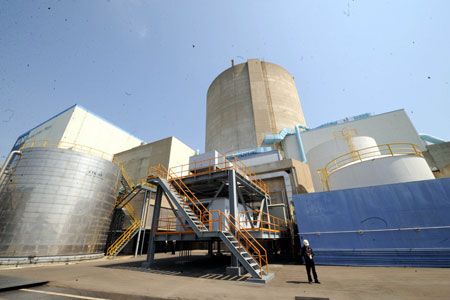Nuclear policies up in the air

The Gori No. 1 nuclear reactor in Busan has been the subject of safety debates in recent months. / Korea-China FTA Korea Times file
This is the last in a three-part series analyzing the latest issues confronting the country’s nuclear power plants. ㅡ ED.
Whoever wins the presidency in the Dec. 19 election will seek to apply the brakes to the Lee Myung-bak administration’s increasing reliance on nuclear power as a source of electricity, analysts said Monday.
All three major candidates ㅡ Park Geun-hye of the ruling Saenuri Party, Moon Jae-in of the main opposition Democratic United Party and independent Ahn Cheol-soo ㅡ have yet to unveil concrete pictures of their energy policies, but there is a sense that they share common ground on the surface: no more nuclear power plants.
They equally claim the country should increase its reliance on renewable energy sources to generate electricity. But they have stopped short of offering comprehensive details about the specifics of the alternative sources they favor.
Given this, some experts haven’t ruled out the possibility that the government’s plan to build more nuclear reactors could be subject to a major change. Backing up that scenario is a slew of stoppages of nuclear reactors due to technical problems in recent months and last week’s discovery of parts supplied with forged quality certificates, which has public faith in the safety of nuclear reactors at an all-time low.
Yet many others disagree, saying there is no instant replacement with the same effectiveness as nuclear energy amid the increasing risks of power fluctuation.
Korea operates 23 nuclear reactors, supplying about 30 percent of the nation’s total electricity needs. It plans to build an additional 16 reactors by 2030.
With three reactors offline due to mechanical problems and several more halting operations for routine safety checks, Minister of Knowledge Economy Hong Suk-woo warned last week of a “dramatic” drop in national power reserves to 300,000 kilowatts in January, compared to the government’s target of 4.5 million kilowatts.
“The continued use of nuclear power will be allowed only when the safety of relevant facilities is guaranteed,” Park posted on the National Election Commission’s (NEC) website. “On top of this we should make more efforts to develop new energy sources at home and abroad to ensure stable power supply under any circumstances.”
She added that if elected she would collect opinions of people in various industries to decide the “ideal mix” of energy sources for power generation to which the government will stick to for as long as the next two decades.
Moon has made it clear that his election would lead to a drastic departure from the pro-nuclear power stance of the outgoing President Lee, while Ahn claims a moderate transition toward renewable energy sources.
Yet with the two opposition contenders engaging in negotiations to unify their bids, it’s hard to predict how a revised version of their merged policies would take shape.
Moon’s spokesman Jin Sung-joon demanded in a posting on the NEC website that the government not approve the extension of the operational lifespan of aging nuclear reactors.
“The country’s increasing reliance on nuclear power defies global trends,” the spokesman said. “Old reactors that have outlived their original lifespan should be retired. And power shortages as a result of their absence should be covered by generation using renewable sources.”
Twelve of the country’s 23 nuclear reactors are subject to state inspections to determine whether they are safe enough to operate beyond 2030.
The lifespan of the oldest reactor has already been extended. Gori-1, which went into operation in 1971, was initially set to cease operations in 2007 but has been approved for use until 2017. The second-oldest Wolsung-1 reactor completes its 30-year run on Nov. 20 and requires government approval for another decade in operation.
Ahn echoes Moon’s stance. His spokeswoman Chung Yeon-soon calls for scrapping the government’s plan to build more nuclear plants. She said if Ahn is elected, the government will increase the nation’s power supply using renewable energy for 6 percent of the country’s electricity needs by 2017 and 30 percent by 2030. It currently stands at 2.7 percent. <The Korea Times/Park Si-soo>






















































